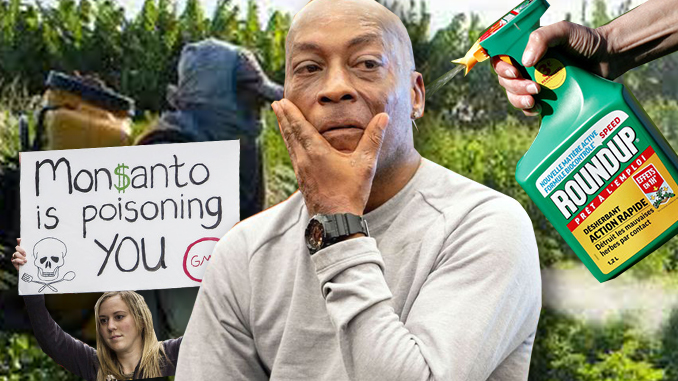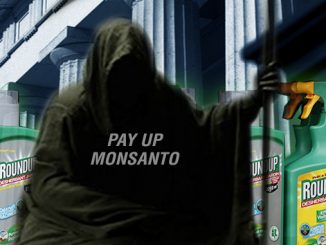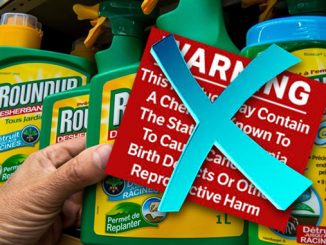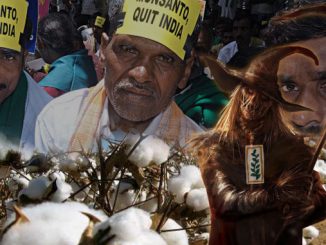
The profit-hungry agri-giant often called “the evil empire” has been slapped for poisoning a school groundskeeper who used their glyphosate-based weed killers, and now, the behemoth is looking at more than 5,000 similar lawsuits. Glyphosate has recently been confirmed in oat breakfast cereals and bars, yet the FDA continues to remain silent about its dangers even while other countries ban Monsanto products.
By S.T. Patrick
Sometimes David really does defeat Goliath. A California jury this month found that Monsanto’s glyphosate-based weed killers like Roundup caused the cancer of school groundskeeper Dewayne Johnson. As a result of the decision, Monsanto has been ordered to pay Johnson $289 million in damages. Johnson may be only the first victorious David, as Monsanto now faces over 5,000 similar lawsuits across the United States.
Despite a Monsanto spokesman arguing that “more than 800 scientific studies and reviews . . . support the fact that glyphosate does not cause cancer and did not cause Mr. Johnson’s cancer,” the jury awarded damages to Johnson, whose attorney explained that, for the first time, jurors were privy to internal company documents “proving that Monsanto has known for decades that glyphosate and specifically Roundup could cause cancer.”
The cancer arm of the World Health Organization in 2015 had determined that glyphosate is “probably carcinogenic to humans.”

Study results published just days after the Johnson news broke revealed that some oat breakfast cereals and snack bars marketed toward children are laced with glyphosate. Of the 45 products containing oats tested by the Environmental Working Group (EWG), 43 contained traces of glyphosate and 31 exceeded the EWG’s child-protective daily exposure benchmark of 160 ppb.
EWG reports the FDA is aware of the dangers from glyphosates but remaining silent: “In April, internal emails obtained by the nonprofit US Right to Know revealed that the Food and Drug Administration has been testing food for glyphosate for two years and has found ‘a fair amount,’ but the FDA has not released its findings.”
Glyphosate has been used by Monsanto in weed killers since 1974, and organics activists are claiming Monsanto has known about the effects of the chemical since the early 1980s. Monsanto has since aggressively marketed glyphosate as “safer than table salt” and “practically nontoxic.”
Monsanto has not only tied its weed killers to glyphosate; the agrochemical giant tied its billion-dollar seed business to the same toxic chemical. Monsanto has inserted genetically modified organisms (GMOs) into plants since 1983. It introduced GMOs to crops in 1987. A line of “Roundup Ready” seed was introduced to coincide with the glyphosate weed killers. Products like Roundup would then kill the weeds without killing the seeds. Monsanto is the world’s largest distributor of seeds today, controlling nearly one-quarter of the world market. DuPont is second and shares with Monsanto a commitment to GMO seed production.
This is not the first time Monsanto’s chemicals have come under fire. Monsanto abandoned DDT production “for economic reasons . . . long before any environmental concerns were brought to the table.” Despite later reports that proved its toxicity, Monsanto’s website still touts DDT as an effective preventative measure against malaria. Apparently, deadly chemicals do kill mosquitoes. The pesticide was banned by the Environmental Protection Agency in 1972 because it was said to cause cancer and kill wildlife.
From 1965 to 1969, Monsanto was one of the nine companies contracted by the U.S. government to manufacture Agent Orange for use in the Vietnam theater of war. It was designed, according to Monsanto, as a “defoliant to protect the lives of U.S. soldiers.” It was also used to destroy enemy food crops—and lives. The Vietnamese government reported that as many as 3 million people have died or have suffered illnesses that stem from Agent Orange. Many American veterans have settled out of court with Monsanto, but some denied the settlement, as it would have exempted them from certain government benefits and care.
In 2004, Monsanto spokesperson Jill Montgomery asserted that the company should not be held liable for any illnesses or deaths resulting from Agent Orange.
“We are sympathetic with people who believe they have been injured and understand their concern to find the cause,” Montgomery said. “But reliable scientific evidence indicates that Agent Orange is not the cause of serious long-term health effects.”
After Johnson’s Roundup lawsuit verdict was announced, Bayer AG, which had purchased Monsanto for $66 billion in June, saw its stock plunge more than it had in seven years. The $289 million judgment erased more than $11 billion from the German drug conglomerate’s market value. Bayer had already intended to drop the Monsanto name from its operations. Monsanto has for years earned nicknames such as “the evil empire” and “the world’s most evil corporation.” Bayer acquired the profits yet wanted to discard the reputation and public opinion.
Globally, governments and courts have taken a harsher stand against Monsanto’s products. A judge in Brazil recently suspended the sale of all products containing glyphosate. A Monsanto tribunal took place in 2016-17 in The Hague. The five judges presiding over the tribunal ruled that the activities of Monsanto have a negative impact on basic human rights.
Dewayne Johnson is one of millions sickened, injured, or killed by Monsanto products. Yet, the company still maintains a stranglehold on the bureaucrats within the government.
Until politicians are exposed for their loyalty to and, in many cases, their work for Monsanto, the company’s power within the government will continue to grow—like a fungus ironically immune from Monsanto’s most dangerous products.
S. T. Patrick holds degrees in both journalism and social studies education. He spent ten years as an educator and now hosts the “Midnight Writer News Show.” His email is [email protected].




